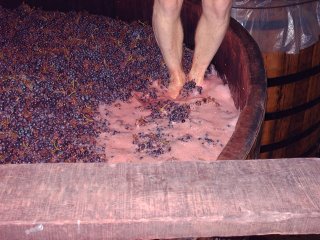I was sat in the office earlier on, working on the wines for New Years Eve, when our F&B director asked me to join him in the drawing room. He was there meeting with a rep from Whyte & Mackay who was introducing a range of malts to him from Isle of Jura and Dalmore. Now Dalmore is a whisky that I havent really seen much of, except for a really rare and exclusive bottle of 50 year old that we had when I was at Gleneagles. A ludicrously expensive cut glass decanter with an eyewatering price (off the top of my head I think it was over £300 a glass). So it was interesting to see the range and have the opportunity to taste a few of them. The one that stood out was a 40 year old Dalmore. The sample was quite dark in colour, almost mahogany in tint with a most amazing nose of spicy chocolate. It reminded me of the hot chocolate that they make in Peru from Maya Gold chocolate bars - dark cocao, cinnamon, cloves, nutmeg, rich warming spices. The strange thing about the whisky was it was a cask strength one, coming in at a surprising 40%abv. The whisky was as smooth as a smooth thing on the palate, lingering spicy tones on the finish and the most amazing length. It kind of spoilt the rest of the tasting, because the flavours seemed to linger, even after trying three or four of the others.
Im not really a whisky drinker, in fact Im not a whisky drinker at all, but truthfully, I wouldnt be upset if someone gave me a glass of this.
The presentation of the whisky is quite superb, the bottle is quite plain and understated, with a metallic stags head emblem attached to it, and a very discreet label indicating what it is. It comes in a fabulously decadent leather trimmed box, with the usual tasting notes etc. By now you can probably imagine that the price is going to be somewhat scary. You would be right, it goes for over a £1000. So I wont be buying one for myself, but Id still like to list it.
Friday, May 22, 2009
Thursday, May 14, 2009
Crappy Websites
Argghhh!!!!!!!!!!!!!!!!!!!!!!!!!!!!!!!!!!!!!!!!!!!!!!!!!!!!!!!!!!!!
To any wineries/pr people etc who might still read this, or may well come across it, here are a few suggestions to keep you on the right path.
1) make your webiste easy to navigate. Sounds simple, but so many seem to get it wrong. Going back to a home page is one thing that is most often negected.
2) Flash is a pain in the arse to navigate, slow to load (Im working here on a dedicated high-speed networked system and its still dead slow, feel sorry for the poor suckers on crappy broadband packages!)
3) Provide pdf files of information on your wines, sommeliers love this!!!!!!
4) Dont try too hard to be the next Bonny Doon website - be creative but remember why people are visiting the site - to find out more about your wines.
5) WTF is up with the bullshit about having to be 18/21 to access the website??? You hosting hard-core pron or something? Since when did licenscing laws prevent access to information about alcohol? I dont get id'd when I buy a copy of Robert Parkers wine guide or the latest Decanter magazine. You can encourage responsable drinking by being more open about alcohol, teaching people about what it is, how it affects your body/behaviour etc, not hiding behind some ridiculous restrictive access.
Subscribe to:
Comments (Atom)




